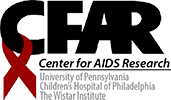HIV/AIDS Research Mentoring
The Partnership/Mentorship program of the Developmental Core of the Penn CFAR is dedicated to providing short-term mentorship for applicants to the CFAR Developmental Core Pilot Awards Program. The program is designed to assist faculty in launching a successful career as independent investigators in HIV-related research.
As part of the grant review process, expert reviewers from within the Penn CFAR community, with guidance from the CFAR Developmental Core, evaluate the proposed study teams and create new mentorship and partnership relationships as an additional benefit of the award. This partnership/mentorship complements traditional mentoring provided by the direct scientific supervisor of the applicant and is typically designed to last for 18 months, or until the first NIH grant submission. When assigned, mentors are required to be utilized as a term of the CFAR pilot award. Mentoring is also available and strongly encouraged for applicants whose pilot projects were not funded.
Chosen partners/mentors are typically experienced CFAR faculty familiar with Penn CFAR and the services available in its cores. They are recognized and mature scientists who are highly respected in both the local and international scientific community with clear records of accomplishment in research and in training graduate students and postdoctoral fellows. Non-CFAR senior faculty may also be selected if their expertise supports the successful completion of the pilot project.
Pilot Feedback Talks
The Developmental Core also sponsors opportunities for junior investigators and awardees. Pilot Feedback Talks provide a venue for junior investigators to prepare, rehearse, and present their scientific work for open feedback from their peers and other members of the CFAR community. The Developmental Core coordinates one required feedback talk for each pilot awardee. Additional feedback talks can be coordinated by the Developmental core at the awardees request when community feedback is desired to advance aspects of the work.

